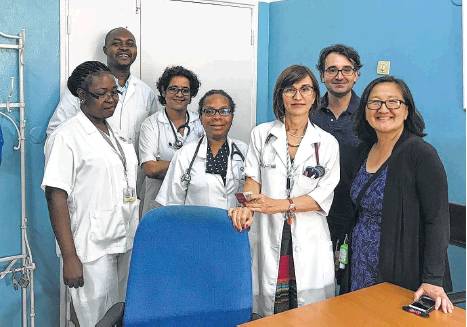S.A. team produces a quick, cheap test for TB
By Megan Rodriguez STAFF WRITER
San Antonio researchers say they’ve developed a tuberculosis test that makes detection of one of the world’s deadliest diseases more affordable and less time-consuming for patients in developing countries.
Texas Biomedical Research Institute’s Jordi Torrelles — head of the Population Health Program — and his team started work on the TB test in 2017, and say it costs $7.20, provides results within 13 days and tests for resistance to 11 medications.
Some tests for the disease cost more than $600, check for resistance to three commonly used drugs and can take up to 86 days to get results.
Clinical testing will begin in the Democratic Republic of Congo in November. Torrelles said he hopes the new test will be approved by WHO within the next four years.
“We are very excited about the opportunity to see if it is successful in the field,” Torrelles said.
As one of the top 10 deadliest diseases, TB infected 10 million and killed 1.3 million people in 2017, according to the World Health Organization.
TB typically affects the lungs and is caused by bacteria that is spread through the air. It’s curable and usually preventable, but 95 percent of patients are in developing countries.
Torrelles and his team conducted research for the new diagnostic test in labs with 21 drug-resistant strains of TB provided by collaborators from Columbia University and the Public Health Research Institute.
Torrelles also said he’s currently testing the new test plates with the Department of State Health Services Texas Center for Infectious Disease in San Antonio. Torrelles will study 100 samples through state health services and 250 samples when he works in Congo.
Shu-Hua Wang, professor of medicine at the Ohio State University, worked closely with Torrelles to develop the test.
“The test can decrease the development of drug resistance because we are not just treating (patients) with agents that are not effective for them,” said Wang, an infectious disease expert. “We will know which drugs are effective for them and be able to personalize individual therapy.”
Wang said the test also can be used every 30 days to see if patients are responding to their treatment or developing drug resistance to any of the medications.
Since the new plates were created with rural limitations in mind, Torrelles said they can go four months without refrigeration. Also, they don’t need to be taken to a hospital or lab for analysis because can be read by sight instead of a machine.
“This is a test that you can do anywhere, and anybody can do it,” Torrelles said.
In developed countries including the U.S., molecular diagnostic tests for TB provide results within a couple of days. However, Wang said this testing won’t be available in developing countries anytime soon, so the Texas Biomed team’s test is the most effective current solution.
“Our goal is to decrease the global burden of TB, but this could be a major gap measure until we have access to molecular testing everywhere else,” Wang said.
Torrelles and Wang spent 12 days in Africa this year to try connecting with health care workers who might be interested in using the test plates.
Even with a less expensive and easier-to-use diagnostic test, TB still is difficult to treat. Torrelles said people who are drug resistant require multiple medications for up to two years. The Center for Disease Control estimates the average cost of treatment for some of the most drug-resistant forms of TB can cost patients more than $500,000.
Right now, the test’s $7.20 cost reflects only the expense of manufacturing it. Prices could rise once it’s used outside a research setting, but Torrelles said Texas Biomed is working to secure a patent that could help keep the cost of the test low.
“With successful implementation of these tests, especially within rural areas, can really change the way we treat tuberculosis,” Wang said. megan.rodriguez@ express-news.net
